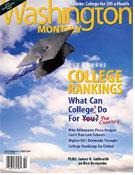College Rankings
 Washington Monthly has put out its annual answer to the US News college rankings, even going so far as to launch a new blog devoted to the subject.
Washington Monthly has put out its annual answer to the US News college rankings, even going so far as to launch a new blog devoted to the subject.
Steve Benen highlights some of the findings:
* Only one of the U.S. News top ten universities — Stanford — makes the Washington Monthly‘s top ten, while high profile institutions such as Princeton, Duke and Penn fail to even crack Washington Monthly‘s Top 25.
* Some of top universities on the Washington Monthly list, like South Carolina State (#6) and Jackson State (#22), are non-elite “red state” schools buried in the lowest tiers of the U.S. News list.
* While all the top twenty U.S. News universities are private, thirteen of the top twenty Washington Monthly universities are public.
* The University of California system grabs the top three slots-including number-one-ranked Berkley — even as the state of California is slashing higher education funding.
* Women’s liberal arts colleges score well in the Washington Monthly rankings, with Mount Holyoke, Smith, Bryn Mawr and Wellesley all in the Top 10. Historically black institutions, such as Spelman and Morehouse, also make strong showings.
Steve says that “We want people to use this information to change the way they think about colleges and universities, the first step toward changing the institutions themselves.” As such, they “rank schools based on what they are doing for the country — by improving social mobility, producing research, and promoting public service.”
As a graduate of non-elite “red state” schools, Jacksonville State and the University of Alabama, I’m all in favor of a ranking system that puts an emphasis on bang for the buck rather than institutional prestige. But, as I’ve noted before, I’m not sure substituting one set of biases for another is that big a step forward.
While the U.S. News guide managed to transform the way we thought of college education a generation ago, I continue to be skeptical that Washington Monthly‘s answer will do the same. As many of my readers noted two years ago, when the rankings had Texas A&M as the best college in the country (it’s since dropped to 5th) how many of the magazine’s board and senior contributors are going to send their kids to College Station for school if Cambridge and New Haven are options? For that matter, are their new hires going to be coming from South Carolina State instead of Harvard?
FYI, South Carolina State University is also an historically Black institution.
So is Jackson State, actually.
You know, you clearly wrote “Jackson State,” but I read it as “Jacksonville State.” Fair enough.
Presumably, this is the education that’s going to keep us competitive in the global marketplace.
As Bluto once said, “Seven years of college down the drain. Might as well join the f*cking Peace Corps.” I’m guessing Steve Benen didn’t find that funny.
Not to be a jerk, but it is Berkeley. Berkeley.
I went to Berkeley and my wife went to Texas A&M (I know, really weird combination), so I think these rankings are just hunky dory. Couldn’t have ranked them better myself.
Seems to me Harvard, Yale and Penn just cost the taxpayers about a trillion dollars, geniuses that they are. Another triumph for the elite private universities.
Substituting one set of biases for another is exactly what is needed. Different perspectives on what makes a college good allows parents and students who have the luxury of choice to hear many points of view. Having one single publication making those calls is actually a disservice.
What keeps us competitive in the world is not what we learn in college but what we learn after college while working. The culture of many countries puts the emphasis on hard work in school followed by a more relaxed work environment. In the US we see school as a fun time and then knuckle down when we get a job. Michael Barone pointed this out in one of his books. American business is competitive because of American business, not it’s colleges.
Gig’em aggies!
There is no way Texas A&M is the “best” college in teh nation. No. Way.